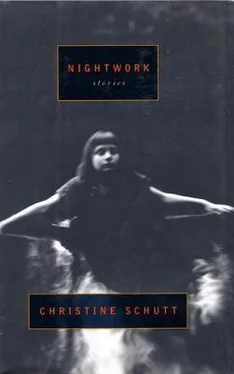“Hush with that noise! You’ll wake Martin,” she scolded, then asked, “What is it you want?”
The brother grinned his hungry face, the one he wore when the drugs wore off, and he propped himself against the cupboards. This face was a face she knew regardless of season — slack or sly, it was hard to tell — but his eyelids twitched and his speech slurred in its wavering volume of request. “Do you still—” he began.
“Still what?” she asked. “What?” She could not understand! “What is it you want?” she asked this brother again and again. “What is it?”
When anything, she told the girls, she would have given him anything — and he knew this.
He was spoiled.
“Yes, yes, yes, yes, yes,” the girls said. They said, “Margaret, we’ve been there.”
“But he didn’t answer,” Margaret said. “That time he was in my arms — flat out on the floor I found him and pulled him up against my knees — his mouth stayed shut.”
“This was in the living room,” Margaret said.
“I have his watch. I took it off. I thought. What the fuck does it matter to you? Look at all this stuff of his I’ve got,” and she started opening his drawers — beer caps, rubbers, cans of spray paint. “Can you imagine,” she told the girls, “the bony rattle of the cans at night and Martin hollering for him to quit!”
“You must have known this about my brother,” she said, “surely,” and she threw away a plastic bag, burnt matches, some kind of stuck-on candy.
“Yes,” the girls said. “Yes and no.”
“We knew him first from the yearbook. We guessed his long smile was to cover up his teeth. We thought we would like him, and we did.”
“He found us names,” the girls told her — okay-sounding gang names from unflattering sources, from defects like moles or stutters.
“Spider was mine,” a dark girl said. “Can you guess from where he got it?”
But he was affectionate, the girls told her. He seemed hardest on himself — wedging his narrow body in any narrow space. He said he wasn’t smart.
“You are!” the girls had told him. “You only have to learn how to work!”
Margaret said, “I remember his crying. He woke me with his crying — how many times?”
“Yes,” they said, yes to what she tossed before them: the pink and yellow bodies of the skin magazines, sticky tubes of jelly. “He only told us he was sad,” the girls said.
“What for?” Margaret asked. “What was ever denied him?” Margaret said, looking past the girls to see if she could see his knotted chest and arms and shoulders in his furious abandon — shoving, shoving himself against a loose shape whose head knocked against the headboard of the bed. The noise! The noise! The old masturbator from next door, crying out, he couldn’t stand it, Margaret; he couldn’t stand this fucking boy!
He was a boy.
He woke with his hands between his legs.
He cried out, “Is there anything to eat?” Doors slammed, or else he slunk past in his tired clothes. The light was afternoon light or later — and cool. All day he slept; skin flakes flew up when his sheets were tossed, also fingernails, hair — his hair was anywhere, as was the glass imprinted with his ghostly mouth.
“All this talk about this boy,” she said to the girls, when he was just a boy, who lived, a brother with his sister and his sister’s husband — in odd arrangement — but who did not these days?
Oh, that these fervent thoughts we have of our dead would sift into their spirit world and warm them with the truth of how they matter to us still, how they are missed. Dale I remember, shy man, large, embarrassed nose and ears, how I often knocked against him, waiting for a ride to wherever it was I was going then, a child, sleeping over, the sheets always cold and a terrible thirst. The dry part of going away, my mouth open to it in the back of Dale’s truck, faced forward: all that green air, until I was so dry and beaten — lashed by my own hair — I was exhausted and sad, sad to leave him. I said, “I want to stay with you.” I said this to him, sometimes lying. I thought, as children do, that I was necessary, that Dale’s life without me was just a run-down house and a wife named Ida.
The pink of Ida’s candy pink gums and tail-fin glasses — Ida was ugly in ways even a young girl would notice — me five, six, seven when I stayed with Ida and Dale those times my mother couldn’t find her mother to do it. My glamorous mother, of course I would notice: Mother all high color and Ida, muddy hair and eyes — those preposterous pink gums. The way Ida sucked on her teeth after supper — after any meal— but Dale never seemed to mind. Dale, in his damp bib overalls and lace-up shoes, was happy to chew on a toothpick.
The homely everyday about their lives!
They are both dead now.
I listen to your workmanlike exhausted sleep, the gagged intake and hissed release of breath, heel scratch, then the wounded sound in your descent before you startle. Are you awake?
“Are you awake?” I ask.
Nothing.
“Are you?” I ask again, and lean closer to your ear, to you asleep.
How can you sleep in this cheap motel — generic, unmarked, grouted vanity, unmarked surfaces, castered bed?
I saw the foot of Dale’s bed in passing, and it looked hard to me and plain — plain as Ida shucking down the hall in pink chenille and mukluk slippers.
Dale’s house is the house we see at either end of town, small and white and near the road, muddy yard and broken hedge, a dead car overgrown, and something that may or may not be a fence, a flag and maybe flowerpots from cut-up painted tires — a grill, a laundry line, a dog chained even in the rain. I can hear him still. Dale’s Lucky, the shunt and clank of him leashed and whining, rubbing fecal streaks against the side of the garage because the mutt can’t reach the house, although the house smells of him — of wet dog.
Onion, there is the smell of that, too, the front door clacking onto Ida’s kitchen — the impact of the kitchen — hard floor and mean light, the smell of wet dog. On the steps to the kitchen, big unbuckled boots, openmouthed and panting — I think the boots were animals only waiting to be fed.
Early risers on the road, you buy us soft glazed dough-nuts and doughnut-shop coffee, and we eat and drink, driving into the red eye of another yellow morning. You say, “Before we know it,” and then attach to this clause whatever is passing — the towns, the states, this summer, our lives.
“Oh, please don’t say it,” I say.
The corn silk is black-yellow, and there are unexpected, early turnings — bloody leaves and blown weed, bowed fields, picked barrens.
Dale was used to seeing blood, working out-of-doors and with his hands the way he did, and yet the sight of Ida’s bloodspurt from the doctor-lanced boil took Dale’s breath away. “He fainted,” Ida said, right there in the office before them both, Ida and the doctor, looking over Dale — amazed at what could fell a man.
Love — not of the kissing sort; I never even saw them touch — but shadowing one another the way they did in sickness, toward the end, when Dale’s heart had become the thing we knew would kill him — in their every movement bent to each other, love it was.
The special diet, the new hours, the slow, deliberate life Dale slunked in as in a too-big coat, playing at being old and near to dying, when he was not so old, only that he looked it and was afraid.
The mean life I thought Dale led — even so, he loved it and was afraid. He was afraid of being ambushed, so that the clothes he wore were the clothes I guessed he wanted to be found in — ready for it, the next, last bed.
Читать дальше












